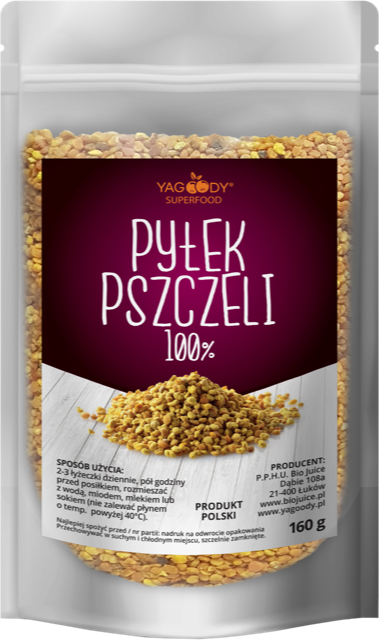
Bee pollen

Superfoods

 160 g/20 kg
160 g/20 kg 75/1 pcs
75/1 pcs 36/25 boxes
36/25 boxes
Flower pollen, known also as bee pollen, is tiny balls collected by bees to feed young bees in the hive. More than 250 different substances have been detected in bee pollen, including:
- amino acids (including sulfur amino acids needed as a building block for hair and nails)
- carbohydrates,
- fats (phytosterols, saturated and unsaturated fats),
- minerals – magnesium, sodium, potassium, calcium,
- vitamins – C, A, E, B1, B3, B5, biotin, folic acid…
- trace elements – copper, manganese, zinc, chromium, silcon, selecium, iodine…
- aminokwasy (w tym aminokwasy siarkowe potrzebne jako budulec włosów i paznokci)
- węglowodany
- tłuszcze (fitosterole, tłuszcze nasycone i nienasycone)
- minerały – magnez, sód, potas, wapń,
- witaminy – C, A, E, B1, B2, B3,B5, biotyna, kwas foliowy…
- pierwiastki śladowe – miedź, mangan, cynk, chrom, krzem, selen, jod..
For whom bee pollen?
- for children and adults,
- for people on a diet,
- for people with congestions,
- for people with hypertension and atherosclerosis,
- for people with depression symptoms,
- for people with cold,
- for those, who have concentration problems.
Dosage:
Prophylactically: 1 teaspoon three Times a day before eating.
Therapeutic: 4-8 flat teaspoons daily. The treatment should last from 1 to 3 months.
Bee pollen can be taken directly, in a ground form as an addition to flakes, cottage cheese or dissolved in a warm beverage in proportion ½ or 1/3 glass at temperature not exceeding 40 Celsius degree.


